NASA confirmed Wednesday morning that it is partnering up with Russia to build a space station near the moon.

The announcement is part of a project the space agency unveiled in March, dubbed “Deep-Space Gateway,” which is meant to increase human presence in the solar system.
READ MORE: Peggy Whitson back on Earth after 665 days in space
In a statement, NASA explained the alliance with the Russian Space Agency, called Roscosmos, ensures it has the “strategic capability” to carry out the lunar mission, which would explore the area surrounding the moon. It also makes executing the mission more affordable.
The technology developed for this mission is meant to eventually lead to a mission to Mars, the statement noted.
In an earlier release about the Deep-Space Gateway, NASA explained: “Missions in the vicinity of the moon will span multiple phases as part of NASA’s framework to build a flexible, reusable and sustainable infrastructure that will last multiple decades and support missions of increasing complexity.”
WATCH: NASA space cameras capture mysterious flashes of light from Earth

The success of the mission to the moon will confirm whether humans have the ability to withstand longer trips, it added.
The space station’s exact concept is still under development, but it will involve a crew of astronauts, as it orbits and lands on the moon. The work is expected to begin in the 2020s.
The head of Roscomos, Igor Komarov, confirmed the news in a separate statement.
WATCH: NASA’s Saturn-orbiting Cassini spacecraft faces fiery finish

“We have agreed to join the project to build a new international Deep Space Gateway station in the moon’s orbit,” he said.
The partnership comes after Russia was reportedly considering taking on the mission by itself, but it was deemed too expensive.
While there are political tensions between the U.S. and Russia, they have worked together in space exploration, including on the International Space Station (ISS). Several countries — mainly United States, Russia, Europe, Japan, and Canada — are responsible for operating the ISS, which NASA boasts as the “most politically complex space exploration program ever undertaken.”
- Ontario First Nation declares state of emergency amid skyrocketing benzene levels
- Singh mulls TikTok return as U.S. nears potential ban over security fears
- More financial institutes are offering crypto-services, survey shows
- Possible TikTok ban in U.S. looms after Biden signs bill, setting up legal fight




Comments